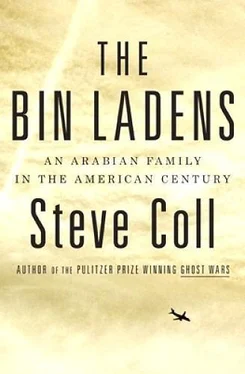As the Great Depression settled in during the early 1930s, however, global travel and tourism collapsed, and along with it the Muslim religious pilgrimage to Mecca. The number of annual pilgrim arrivals in Jeddah fell precipitously, as did other Red Sea trade. Jeddah sank into a period of torpor and hardship. Mohamed Bin Laden soon found that his business in Jeddah was not enough to sustain him. He took to the road to find a paying job, across the vast and empty desert steppes that rose to the east, beyond Jeddah’s walls. Fortunately for him, profound political and economic changes had begun to sweep across the Arabian Peninsula. Oil was at the heart of this transformation—along with the extraordinary king who owned it.
ABDULAZIZ IBN SAUDwalked out of Kuwait in 1902 with a sword, some camels, and a small band of followers to reclaim, in his family’s name, the mud-walled town of Riyadh in the central Arabian plateau, and the paltry realm it oversaw. The Al-Saud had twice ruled this scorched, lightly populated emirate in recent centuries, overthrown each time by Egyptian and Ottoman enemies. Abdulaziz fought more than fifty-two battles across an expanse of hundreds of square miles in his quest for restoration. The battles were often little more than a massed, screaming charge on camels and foot by one malnourished band of rifle-toting Bedouin into the encampment of another, but they could take a toll; by 1932, when Abdulaziz announced at last the formation of the new Kingdom of Saudi Arabia, he bore slashing scars on his arms and body, and he limped from a war wound in his leg.
The king was about six feet three inches tall, broad-shouldered—visible on camelback from across a wide valley. Standing in his majlis court, he towered over many of his subjects and slaves, but he ruled as much by charm as by intimidation. He told visitors that he was like the Prophet Mohamed in that there were “three things in the world” that he truly loved: “Women, scent and prayer.” He kept a vial of perfume in his robes and doused his hands when greeting visitors, so he might pass along his aroma. He possessed a magnetic and persistent smile, and seated on his throne he would launch into meandering monologues filled with metaphorical desert proverbs about treacherous foxes and venomous scorpions. Yet he was a skillful, pragmatic, cold-eyed politician, able to grasp and manage his peninsula’s tribal, religious, and colonial-era complexities better than anyone had done before. “I am not a man of imagination,” he told a visitor. “I am a man of actual fact—that is all I have.” 1
His conquest of Hejaz, the western region of the Arabian peninsula, and of its city of Jeddah, had been the last phase of his campaign, and when he completed it in 1926, it delivered him the greatest prizes he had yet known—sovereignty over Islam’s holiest cities, in Mecca and Medina, as well as the vast tax revenue from pilgrims arriving there, and in addition, access to Jeddah’s Red Sea port. Yet Abdulaziz recognized wisely that his austere army of illiterate plateau warriors and Islamic proselytizers would not be much welcome in worldly Jeddah, so he tried to co-opt the city’s businessmen rather than confront them militarily. He laid a one-year siege at Jeddah’s walls, which reduced the city’s residents to even more desperate poverty than they already knew; the campaign ended when Jeddah’s merchant notables handed him the keys. Still, he kept his distance; as long as the tax revenue flowed, he much preferred the isolated comfort of Riyadh in central Arabia, and he felt more secure there. Hejaz and the Red Sea’s coast, in Abdulaziz’s assessment, was a zone of treacherous British and Italian intrigues.
The collapse of the Ottoman Empire after the First World War had left Europe’s colonial powers in competition for Arabia, a contest slowed by the terrible losses of the war but compelled by the inexorable logic of empire. The interior Arabian Peninsula had never been invaded by a European army—it seemed too barren and remote to bother about. To thwart the Turks, the British had subsidized Abdulaziz until 1925, but they never embraced him fully and he never trusted them, because they also propped up his rivals in Mecca, the Hashemite Sharifs. He felt about the British, he said, “like a father when cross with his son, wishing him dead—but the same father would immediately strike dead whomever said ‘Amen’ to this sentiment.” He wanted the Americans to protect him from British intrigues, and he was also fascinated by the rise of Nazi Germany. He had a crude, often xenophobic view of Christians, and even more so of Jews. “Praise be to God, for fourteen hundred years there have been no Jews in my territory,” he told one foreign delegation; so far as he knew, he had never set eyes on a Jewish person. As Israel’s creation was debated, he was passionate and unyielding in his opposition. “My honor is involved in this matter,” he declared. He assumed that all non-Muslims were unreliable. He asked one Christian visitor with cheerful curiosity, “You drink whiskey, you play at cards, you dance with the wives of your colleagues?” 2
Sex seemed to be the greatest joy in his life, or at least the greatest compulsion. In 1930 he told the Englishman Philby that he had married one hundred thirty-five virgins and about one hundred other women to date, but that he had decided to limit himself to just two new wives annually for the remainder of his years. He bent the Islamic law that permitted four wives at a time by marrying and divorcing rapidly, and by keeping additional retinues of concubines and female slaves. There was a political and even a military aspect to his carnality: “The Saudi state was consolidated by marriage,” as the historian Madawi Al-Rasheed put it, and Abdulaziz often “married the ex-wives or daughters of his ex-rivals and enemies.” 3
Estimates of the number of slaves in his kingdom ran from several thousand into the tens of thousands; several hundred served openly in the monarch’s Riyadh palace. When a slave concubine gave birth to a son, she received her freedom, and in a few rare cases, her son was acknowledged as legitimate. Abdulaziz ultimately recognized about forty-five legitimate sons, who became his royal heirs; the number of his daughters and other children is unknown. 4
For all of his seeming profligacy, the king maintained an austere and pious lifestyle. He did not drink or smoke or permit his aides to wear silk; he prayed five times a day; and in his court the dominant sound from day to day was the quiet clink of coffee cups and the rhythmic chanting of Koran readers. He never doubted that God had called him to rule his desert kingdom; he would do his best to answer this call, and to conform to Islam’s laws, but the rest was in divine hands. The form of Islam he had been taught was severe and intolerant. In the Hejaz, there were Shias and Sufi mystics, and scholars from every historical school of the Sunni tradition. But in the Riyadh court of Abdulaziz there was only the simple and insistent creed of Mohamed Abdul Wahhab, an eighteenth-century desert preacher who had rejected virtually all adornment, art, music, and technology as blasphemy. In the isolated high desert of central Arabia, as the Jeddah architect Sami Angawi put it, “you have either day or night, you have cold or hot. You don’t have these shades. Even the music is only one string…It’s either black or white. It’s either you’re with me or against me.” 5Yet the religious passion of the king’s Wahhabi followers caused him continual trouble—particularly the Ikhwan, or “Brotherhood,” a militia of unbending radicals Abdulaziz created to conquer his enemies. When the Ikhwan threatened to revolt against Abdulaziz because they felt he was not religious enough by their exacting standards, the king turned his guns on them. At the same time, to hold his throne, he had to continuously appease his court’s Islamic scholars, the ulema.
Читать дальше












